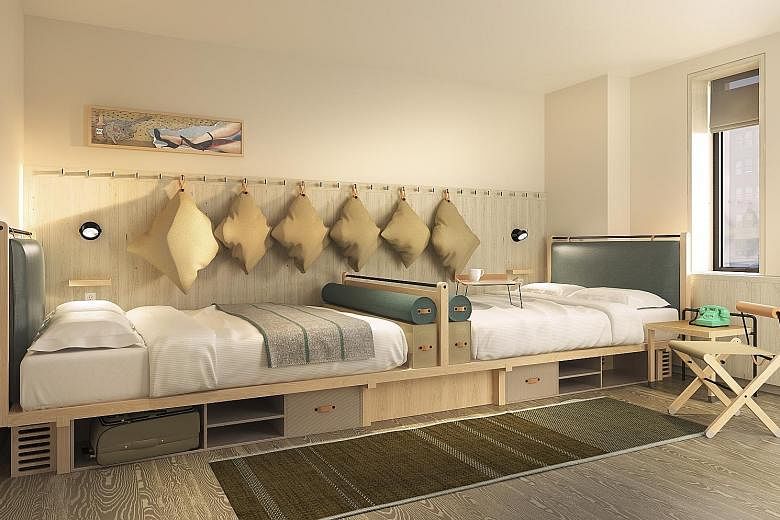NEW YORK • "Tourist" has become a dirty word in the hospitality business. The preferred word? Local.
Travellers can now sign up through hotels and tour operators for experiences arranged by locals.
The latest to join the trend are Marriott International, which recently took a stake in PlacePass, a tour- and activity-booking start-up; and Royal Caribbean Cruises, which just introduced GoBe, a seller - online and through an app - of land-based tours and activities.
The experiences can be as varied as the grand and the unexpected.
On PlacePass, guests can book a private tour of Downton Abbey filming locations, pasta-making lessons with a local celebrity chef or family- friendly outings.
The new moves by these established companies reflect the increasing draw of home-sharing sites, such as Airbnb, which promise travellers the chance to live like a local, said Ms Fiona O'Donnell, director of travel and leisure research at Mintel, a market research firm in Chicago.
"Guests want to feel like they are experiencing something in the design or the local flavour," she said. "They want it to be memorable and part of the local scene, not like they are tourists."
The moves are also an extension of a trend where hotels are moving away from a uniform experience, no matter where they are, to one in which properties blend into their communities and offer travellers access to local artists and businesses.
Hotel operators have a trove of data about the preferences and behaviour of their frequent guests, said Professor Bjorn Hanson from the Jonathan M. Tisch Center for Hospitality and Tourism at New York University.
Now, he said, the hotels are using that data to get travellers to spend more money when they visit. "Growth is slowing, so they have to shift their model to target more spending" per guest, he said.
Last year, Airbnb started its own Trips booking site, on which local "experts" sell experiences they put together, like a seven-hour day working and dining in an urban garden with a Los Angeles documentary film-maker, or a three-day burlesque dancing class in London, complete with a workshop on making nipple tassels.
TripAdvisor, the online travel booking site, bought Viator three years ago. The booking site's non- hotel revenue rose by 31 per cent last year, while revenue from its main hotel-booking business was down slightly.
The start-up Hello Scout offers concierge service and activities booking via its website and text messaging for independent boutique hotels in six cities, including New York, San Francisco and Seattle. Hotel guests use it to text local experts to book events or find restaurants or other hangouts. Travellers pay a fee for the bookings and the service is free for the hotels.
There are also start-ups that connect travellers with locals for dining-in experiences, such as BonAppetour, where guests can book lunch or dinner at the home of a chef in Rome or go to a Parisian dinner party in a 19th-century apartment near the Champs-Elysees.
At the Stafford Hotel in London, the executive concierge, Mr Frank Laino, created and is the host of a walking tour for guests to his favourite places in the St James neighbourhood, including visits to places not open to the public, such as Spencer House, Princess Diana's ancestral home; and Lock & Co, the world's oldest hat shop.
Marriott's investment in PlacePass adds to its membership rewards programme, which it had been building into an "experiences marketplace", where points could be redeemed for local music, sports, food and dining, and cultural activities.
The technology will be incorporated into the mobile app that hotel-rewards members use to check in and out and to unlock their room doors.
Marriott sees its Moxy brand as a boutique hotel with the heart of a hostel, Ms Vicki Poulos, the brand director, said.
The hotels are typically in urban settings that are destinations for travellers seeking a new experience, she said, different from a hotel in a suburb where travellers are not necessarily staying over to learn something new.
"We're really making sure we infuse that local culture," she said. "People are determined to get to know what the community has to offer."
Its Times Square location is set to open in the summer, to be followed by a second site in Manhattan and three others in Denver, London and Seattle.
Rooms in the Times Square hotel and others are 183 sq ft, creating a space challenge in keeping with living in the Big Apple. Moxy calls this "urban camping" and has installed wall pegs to move furniture off the ground and make room for yoga, Ms Poulos said.
Another brand that Marriott inherited with its acquisition of Starwood Hotels last year, Aloft Hotels, sponsors live music performances by area artists.
Hilton Hotels' budget Canopy and higher-end Curio brands also draw on the local scene.
The Darcy, which opened in the spring in the Logan Circle neighbourhood of Washington, is a Curio hotel that will feature local celebrity chefs and room service with drinks featuring locally made Green Hat Gin and other products.
NYTIMES

